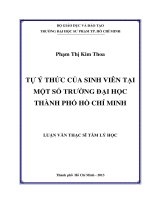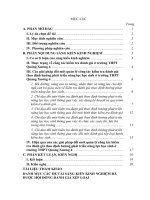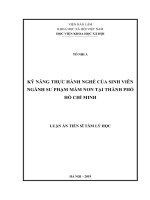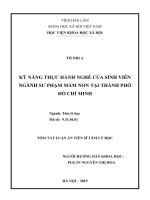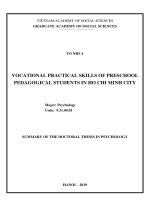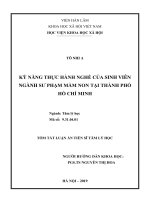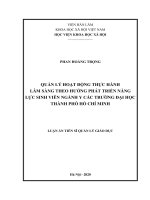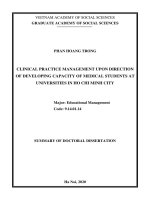Quản lý hoạt động thực hành lâm sàng theo định hướng phát triển năng lực của sinh viên ngành y các trường đại học thành phố hồ chí minh tt tiếng anh
Bạn đang xem bản rút gọn của tài liệu. Xem và tải ngay bản đầy đủ của tài liệu tại đây (416.7 KB, 27 trang )
VIETNAM ACADEMY OF SOCIAL SCIENCES
GRADUATE ACADEMY OF SOCIAL SCIENCES
PHAN HOANG TRONG
CLINICAL PRACTICE MANAGEMENT UPON DIRECTION
OF DEVELOPING CAPACITY OF MEDICAL STUDENTS AT
UNIVERSITIES IN HO CHI MINH CITY
Major: Educational Management
Code: 9.14.01.14
SUMMARY OF DOCTORAL DISSERTATION
Ha Noi, 2020
The dissertation has been completed at
GRADUATE ACADEMY OF SOCIAL SCIENCES
Supervisors:
1. Assoc. Prof. Dr. Nguyen Thi Hoa
2. Assoc. Prof. Dr. Nguyen Sy Thu
Examiner 1: Assoc. Prof. Dr. Nguyen Xuan Thuc
Examiner 2: Dr. Nguyen Thi Yen Thoa
Examiner 3: Assoc. Prof. Dr. La Thi Thu Thuy
This doctoral dissertation will be defended before the Panel of
Examiners, at Graduate Academy Of Social Sciences
At…… on……. 20
This doctoral dissertation can be found at:
National Library of Vietnam
Library of Graduate Academy of Social Sciences
INTRODUCTION
1. Rationale for the study
Among training activities at university, vocational training plays a key role in
improving the quality of professional training, determining the working ability of students
after graduation. Following the current trend of integration of the country, vocational
training for students should focus on comprehensive development which integrates
knowledge, skills, and practice, as well as on how students after graduation are able to put
things they learned into practice, to orientate and to develop themselves in the direction of
the defined educational goals, on which basis, vocational training promotes the quality and
capacity values to meet the requirements of society. Therefore, vocational practice
management, in general, is one of the urgent needs. The medical profession is directly
related to human life and health. That requires medical students, in the learning process, to
practice prudence, thorough thinking, positive thinking, practical problem solving, and
decision-making skills, as well as teamwork and the ability to work independently. Students
who are able to practice health care treatment for the sick need to spent 4-6 years on clinical
practice during their studies. In addition, medical ethics stipulates that protecting,
preventing, maintaining, and improving human health is a noble responsibility and
obligation of medical students. Therefore, even when studying at university or after
graduation, medical students cannot make mistakes in practice. Therefore, the management
of professional medical training should focus on the management of clinical practice.
Practical training needs to help students integrate knowledge, reasoning and practice.
Clinical practice management of medical students has attracted many research
projects with different approaches. Currently, clinical practice training upon direction
of developing capacity has been implemented at many medical universities across the
country. However, there is little in-depth research on evaluating the clinical practice
management process following the capacity-building for medical students. From the
above reasons, we choose the issue of "Clinical practice management upon direction
of developing capacity of medical students at universities in Ho Chi Minh city" as
the doctoral dissertation topic.
2.Aims and objectives of the study
2.1. Aims
Based on theoretical research and assessment of the current status of clinical
practice management in the direction of capacity development for medical students at
universities in Ho Chi Minh City, the thesis proposes many management solutions for
clinical practice activities in the direction of capacity development of medical
students at universities in Ho Chi Minh City, contributing to improving clinical
practice activities for students.
2.2. Objectives
1) Review the research situation on clinical practice manage ment upon
direction of developing capacity of medical students.
1
2) Build a theoretical basis for managing clinical practice activities upon
direction of developing capacity of medical students.
3) Assess the current situation of clinical practice management upon
direction of developing capacity of medical students and the factors affecting the
management of clinical practice activities upon direction of developing capacity of
medical students at universities in Ho Chi Minh City.
4) Propose some solutions to manage clinical practice activities in the
direction of capacity development for medical students at Ho Chi Minh City
universities. Conducting one trial solution in practice.
3. Subject and scope of the study
3.1. Subject of the study
Solutions to clinical practice management upon the direction of capacity
development for medical students at universities in Ho Chi Minh City.
3.2. Scope of the study
3.2.1.Limitations of the scope of study
The research on clinical practice management in the direction of capacity
development for medical students focus on the following aspects: Managing the clinical
practice objectives in the direction of developing students’ capacity; Managing clinical
practice content in the direction of developing students’ capacity; Managing facilities
for clinical practice in the direction of developing students’ capacity; Managing the
examination and assessment of clinical practice activities in the direction of developing
students’ capacity.
This study was only conducted on nursing students at universities with nursing
majors in Ho Chi Minh City.
3.2.2.Limitations of participants for the actual situation survey:
Managers, lecturers, nursing students of medical universities, and doctors mentoring
nursing students in clinical practice placements.
3.2.3.Limiations of study areas:
This study was conducted at 3 universities/ colleges with nursing majors in Ho Chi
Minh City, namely University of Medicine and Pharmacy at Ho Chi Minh city; Hong Bang
International University; Nguyen Tat Thanh University.
3.2.3. Limitations of the dissertation research objects
-The number of participants surveyed by questionnaire includes: Managers (of
universities and faculties), lecturers, students of 3 universities: 350 people; Doctors
mentoring students at the hospital: 10 people. Total number of participants surveyed by
questionnaire (quantitative): 360 people
-The number of participants surveyed by in-depth interviews: Managers (of
universities and faculties), lecturers: 15; Doctors mentoring students at the hospital: 10
people; Nursing students: 30 people. The total number of participants surveyed by indepth interviews: 55 people.
3.2.4. Limitations on management subjects
2
There are many subjects involved in the management of clinical practice
activities in the direction of developing students’ capacity, including (1) The main
management subjects that manage the clinical learning activities of medical students
(nursing students) are: university leaders (mainly the university principle), leaders of
nursing faculties; (2) The direct management subject is the departments and doctors
mentoring nursing students in the clinical practice placements.
However, in this dissertation, the main subject is identified as the principal
of the medical university and the other subjects coordinate to manage clinical practice
activities in the direction of developing medical students’ capacity.
4. Research Methodology and Research Method
4.1. Research approaches
In order to conduct the research on clinical practice management upon direction of
developing capacity of medical students, the dissertation identifies these following
research approaches: Systems approach; Approach according to the capacity of medical
students (nursing students); Standard approach; Process approach
4.2. Research methods
The dissertation uses the following research methods: 1) Method of studying
documents and materials; 2) Method of experts; 3) Method of investigating by
questionnaire; 4) Method of in-depth interview; 5) Method of testing; 6) Methods of
processing data by mathematical statistics.
4.3. Scientific hypothesis
Clinical practice management upon direction of developing capacity of medical
students at 3 universities in Ho Chi Minh City is performed at an average level. Among
the management aspects, the highest-scored aspect is the management of examination
and evaluation of clinical practice activities in the direction of developing students’
capacity. The lowest-scored aspect is the management of clinical practice objectives in
the direction of developing students’ capacity. If management solutions focusing on
developing professional capacity in line with the law and ethics for nursing students are
proposed and tested in clinical practice activities, it will contribute to improving the
efficiency of the clinical practice management in the direction of developing medical
students’ capacity at universities in Ho Chi Minh City.
4.4. Research questions
This dissertation will answer the following research questions:
1) From what scientific point of view is the research on clinical practice
management in the direction of developing capacity of medical students approached?
What is the rationale for the management of clinical practice activities in the direction
of developing capacity of medical students?
2) What is the current situation of clinical practice management in the direction
of developing capacity of medical students at universities in Ho Chi Minh City? What
are the strengths and weaknesses of this management activity? What factors affecting
this management activity?
3
3) What solutions to improve the efficiency of clinical practice management
activities in the direction of capacity development for medical students at universities in
Ho Chi Minh City today?
5.New contributions of the dissertation
5.1. Theoretical contributions
The research on clinical practice management in the direction of developing nursing
students’ capacity at medical universities in Ho Chi Minh city is currently one of the
few studies on clinical practice management following the capacity-building for
medical students. The dissertation has identified a number of concepts served as a basis
for practical research, clarifying the content and management of clinical practice
activities upon direction of developing capacity of nursing students, pointing out the
factors affecting the management of this activity.
The dissertation has constructed criteria for managing clinical practice activities
of medical universities in the direction of developing nursing students' capacity. This
is the basis for organizing clinical practice activities and for clinical practice
management in line with the capacity-building for nursing students at medical
universities.
5.2. Practical contributions:
The dissertation has evaluated the status of clinical practice activities as well as
the clinical practice management in the direction of capacity-building for nursing
students through 4 following points: Managing the clinical practice objectives in the
direction of developing students’ capacity; Managing clinical practice content in the
direction of developing students’ capacity; Managing facilities for clinical practice in
the direction of developing students’ capacity; Managing the examination and
assessment of clinical practice activities in the direction of developing students’
capacity. The thesis also assesses the status of the factors affecting the management
of clinical practice activities in the direction of developing nursing students’ capacity.
Experimental results show that it is possible to improve the clinical practice capacity
of nursing students when applying the proposed solutions.
6. Theoretical and practical significance of the dissertation
6.1. Theoretical significance
The research results of the dissertation contribute to completing a number of
theoretical issues about clinical practice activities in the direction of developing
capacity of nursing students as well as the management of clinical practice activities in
the direction of developing capacity of nursing students, showing the role of entities in
managing clinical practice activities of medical students.
6.2. Practical significance
The research results of the dissertation can be a reference for principals, faculties,
managers, and lecturers of nursing departments of medical universities in planning and
managing content and activities of clinical practice upon direction of developing
capacity of nursing students.
4
The research results of the dissertation are also a reference for hospitals in managing
nursing students when the clinical practice is performed in those hospitals.
The findings of the thesis are also a reference for nursing students in enhancing their
capacity in clinical practice.
7. Structure of the thesis
Besides the introduction, conclusion, and annex, the dissertation has 4 chapters.
Chapter 1
OVERVIEW OF EXISTING RESEARCH ON CLINICAL PRACTICE
MANAGEMENT UPON DIRECTION OF DEVELOPING CAPACITY OF
MEDICAL STUDENTS
1.1. Existing research on clinical practice management upon direction of developing
capacity of medical students
There are many studies on clinical practice activities of medical students in the
direction of capacity development, such as: Curry & Docherty, 2017, Gravina et al.
2017, Frank et al. 2010 studied the effectiveness of CBME in developing practical
competencies and demonstrated that CBME is very effective in developing clinical
practice capacity for medical, pharmaceutical, nursing and dental students. In addition,
Gruppen et al. 2012 have proven that CBME can bring about the development and
improvement of health care all over the world. L. Lassnigg (2015) [69]; Leung (2002)
[89]; Tan, Chong, Subramaniam, and Wong (2018) [62] showed promise to train the
most professional medical staff, according to L. Parson, Childs and Elize in 2018 [67].
In this regard, there are also studies by Al-Dabbagh and Al-Taee; Horntvedt (2018),
Jauhiainen 2009, Hoffart et al 2017, Nousiainen et al 2018.
1.2 Overview of the management of clinical practice activities of medical students upon
direction of capacity building
Stark, Warne & Street have studied the clinical practice of nursing students, and
Xie et al. 2013 showed that the capacity of medical students in clinical practice is also
reflected in their communication competencies. In general, the implementation of
CBME-oriented education has been carried out quite early in the world for about 20
years, and studies on the management of construction, implementation, evaluation has
been conducted specifically.
In Vietnam, there are a number of authors interested in doing research on clinical
practice management. Some of the following authors may be mentioned: Nguyen Thi
Kim Thoa studied the practical teaching management at The University of Medicine
Pham Ngoc Thach. Regarding clinical practice training at Ho Chi Minh University of
Medicine and Pharmacy, Huynh Thi Minh Hang 2008 and Vo Thanh Nhan 2009
worked on the management of students' academic quality. Dang Van Phuoc, Tran Ngoc
Bao, and Tran Thi Bich Huong 2006 studied the advantages of OSCEs and concluded
that OSCEs are clinical evaluation methods that bring about more positive results than
the old method. Vu Thi Loan at Thai Binh University of Medicine performed research
on managing clinical practice. The research by Nguyen Thanh Son, Yersin Medical
University, Da Lat argued that the current practical training for medical students does
not yet meet the competency standards. Besides medical universities, some researchers
such as Le Duc Trung 2015, Le Xuan Truong 2015, Nguyen Duc Chinh 2014, Nguyen
5
Thi Ngoc Xuan 2015, Nguyen Thu Ha 2014, in various fields of vocational education
and training, also conducted research on vocational training upon direction of
developing students’ capacity.
The issue of clinical practice management has been studied by a number of authors,
but each study approaches a certain aspect. Therefore, the theory about managing
students' clinical practice activities has not yet proven to be comprehensive, systematic,
and intensive. There is some research with a general perspective, some with a specific
perspective. Meanwhile, managing clinical practice activities of medical students
towards competency-oriented is a matter which is yet to be studied in a fundamental
and systematic way. Therefore, there should be scientific studies on this issue.
Chapter 2
RATIONALE FOR CLINICAL PRACTICE MANAGEMENT UPON
DIRECTION OF DEVELOPING CAPACITY OF MEDICAL STUDENTS
2.1. Clinical practice activities for medical students upon direction of capacity
building
2.1.1. Concept
Clinical practice of medical students is a process of implementing actions,
putting theory into practice, including the activities of talking and taking care of
patients in order to collect sufficient information to make a diagnosis, specific care and
treatment plans for patients in accordance with their needs to alleviate the patients'
diseases, suffering or disabilities
2.1.2. Developing capacity of medical students
Medical students have diverse majors, in this thesis, we only study nursing
students.
"Capacity is a combination of unique psychological attributes or personal
psychosocial qualities that act as an individual internal condition, facilitating a certain
form of activity to well perform."
The capacity development of medical students (nursing students) is a change in
the direction of promoting the unique psychological attributes or personal psychological
qualities that act as an individual internal condition, facilitating for the good
implementation of nursing activities by students.
* Some competencies that need to be developed for medical students (nursing students)
According to Decision No. 1352/QD - BYT on 24 April, 2012 on the competency
standards of nursing in Vietnam, the capacity of nursing students is also determined the
basis of competency standards of nursing in Vietnam, which includes the following 3
basic competencies: Capacity of caring practice; Capacity of professional management
and development; Capacity of professional practice in accordance with law and nursing
ethics.
1) Capacity of caring practice
Students need to know the health and illness status of the patients. Students have the
ability to make decisions about appropriate care plans for the patients’ illnesses and
needs.
2) Capacity of career management and development
6
Along with the capacity to practice caring for patients, in the clinical practice
process in the hospital, nursing students also need professional management and
development competencies. This competency is reflected in the following specific
aspects: Students need to be able to manage, record and use medical records in
accordance with regulations; Students need to be able to manage patient care; Students
need to be able to manage, operate and use medical equipment effectively...
3) Capacity of professional practice in accordance with laws and nursing ethics
Besides the capacity to practice patient care, professional management and
development, nursing students also need to be able to work in accordance with laws and
professional ethics. It is the ability to carry out professional activities in accordance
with the legal regulations of the medical sector and the nation’s laws for medical
sectors, as well as the ethical standards for nursing. This capacity manifests itself in the
following specific aspects:
Students practice in accordance with laws; Students practice in accordance with
nursing ethical standards.
2.1.3. Clinical practice activities upon direction of developing capacity of medical
students (nursing students)
2.1.3.1. Concept
Clinical practice activities upon direction of developing capacity of medical
students is a process of implementing actions, putting theory into practice, including the
activities of talking and taking care of patients, which helps promote the unique
psychological attributes or personal psychological qualities that act as an individual
internal condition, facilitating for the good implementation of nursing activities by
students.
2.1.3.2. Some characteristics of nursing students
Nursing training is a sector in the human resource training system for health care.
Nursing students are trained to assist doctors, pharmacists, technicians, and other staff
in the health care system to perform health care in accordance with the needs of the
sick.
To perform the above tasks, nursing students must have the following necessary
qualities: Love for a job, medical ethics; carefulness, high sense of responsibility;
patience, ability to handle pressure; ability to learn and acquire knowledge
2.1.3.3. Content of clinical practice activities upon direction of developing capacity of
medical students
a. Practice taking care of patients:
Learn about the patient's health and illness: Read the patient's medical record;
Implement the technique of taking vital signs and record on the vital function
monitoring sheet; Communicate with patients, relatives of patients; Collect data and
comments;
Perform care for patients: Instruct patients to take medications as prescribed, on time, in
the right way; Implement specialized surgical care techniques such as taking care of
wound drainage, infected wounds, artificial anal sphincter, skin avulsions...; Perform
communication activities with patients;
b. Practice professional management and development during clinical practicum
7
Manage, record, and use medical records in line with regulations; Manage patient
care work; Manage, operate and use medical equipment effectively; Use appropriate
financial resources to taking care of patients effectively; Establish a safe and efficient
working environment; Strengthen scientific research activities
c. Practice professional capacity development in accordance with laws and nursing
ethics
Work in accordance with the laws; Work in accordance with nursing ethics.
2.2. Clinical practice management upon direction of developing capacity of
medical students
2.2.1. Management
Management is the directed, purposeful, planned, and systematic impact of the
managing subject on the managed object.
2.2.1.2. Functions of management
Planning, organizing, implementing, directing, evaluating.
2.2.2. Concept of clinical practice management upon direction of developing
capacity of medical students (nursing students)
Clinical practice management in the direction of developing capacity of medical
students (nursing students) is a directed, purposeful, planned and systematic impact of
managing subjects to students during the course of action of putting theory into
practice, talking and taking care of patients, in order to develop the capacity of caring
practice; capacity of professional management and development; capacity of
professional practice in accordance with laws and nursing ethics.
2.2.3. Managing subjects in clinical practice management upon direction of
developing capacity of medical students
Managing subjects are collectives or individuals that are assigned with tasks and
direct or indirect power in leading, managing education and training students during
clinical practice.
The main subjects that manage the clinical practice activities of medical students
(nursing students) are: University leaders (mainly the university principal), the leaders
of the nursing department, faculties of the university. The direct managing subject is the
hospital where students perform their clinical practice. Specifically, it is the
departments and doctors who directly guide nursing students during their clinical
practicum.
These subjects are related as follows: The university principal directs the nursing
department and other departments to develop a clinical practice plan for students (goals,
requirements, content, time, and results of clinical practice).
2.2.4. Content of clinical practice management upon direction of developing
capacity of medical students (nursing students)
From the content and process of clinical practice activities of medical students and from
the basic functions of management, we identify the content of clinical practice
management in the direction of developing capacity of medical students (nursing
students)
2.2.4.1. Managing the clinical practice objectives in the direction of developing
students’ capacity
a. Clinical practice knowledge
8
The knowledge that nursing students need to gain during clinical practice includes:
Knowledge of understanding the health/ illness status of the patient; Knowledge of
caring for patients ...
b. Clinical practice attitude
Based on the regulations of the Ministry of Education and Training and the Ministry of
Health, the universities determine the goals to be achieved in terms of students' working
attitudes during clinical practice as follows:
Define the role and scope of nursing practice in accordance with the laws and health
policies of the Party, the State, and localities in comprehensive care for patients and
their families; Use medicines, chemicals, and equipment effectively in specialized
practice ....
c. Clinical practice skills
Based on the regulations of the Ministry of Education and Training, the Ministry of
Health, the universities determine the goals to be achieved in terms of clinical practice
skills for students as follows: Skill of managing, recording, and using medical records
as regulations; Skill of managing patient care; Skill of managing, operating and using
medical equipment effectively; Skill of using appropriate financial resources to care for
patients effectively; Skill of building a safe and efficient working environment; Skill of
doing scientific research and evidence-based practice; Skill of developing a health
education program for patients with a typical content/ specific pathology.
2.2.4.2. Managing clinical practice content in the direction of developing students’
capacity
a. Management to develop the capacity of taking care of patients for nursing students
Manage students in learning about the health/ illness status of patients; Manage
students in performing patient care
b. Management to develop the capacity of professional management and development
for nursing students during their clinical practicum
Manage students in recording and using medical records in accordance with the
regulations; Manage students in their patient care work; Manage students in operating
and using medical equipment effectively; Manage students in maintaining and
developing competencies for themselves and their colleagues
c. Management to develop the capacity of working in accordance with laws and
professional ethics for nursing students
In order to implement this management content, the Principal of the University
directs the functional departments of the university and works with the hospital where
students practice clinical activities in the following aspects: Manage students in
practicing in accordance with the laws; Manage students in practicing in accordance
with professional ethics standards
2.2.4.3. Managing facilities for clinical practice in the direction of developing
students’ capacity
The Principal directs functional departments and nursing faculty, along with the
hospital to manage students for these following issues: Helping students keep and
effectively use the facilities for clinical practice including medical equipment, medical
records, sample procedures...; Instructing students how to use medical equipment,
9
including consumables such as gauze, gloves, face masks, bandages, syringes, drainage
tube, medicine... and pliers, scissors, surgical tools,....
2.2.4.4. Managing the examination and assessment of clinical practice activities in
the direction of developing students’ capacity
The principal instructs functional departments and nursing faculty, along with the
hospital to carry out the following points:
Develop and implement a system of criteria for evaluating clinical practice activities of
students according to the competency standards of Vietnamese nurses. Follow the
systematic process to evaluate clinical practice activities of students according to basic
competency standards of Vietnamese nurses.
2.3. Factors affecting the clinical practice management in the direction of developing
students’ capacity
Based on the points of view of the World Health Organization (1997) on clinical
teaching management, as well as on literature research and surveys at hospitals where
nursing students perform their clinical practice, we identify a number of factors
affecting the management of clinical practice activities in the direction of developing
capacity of medical students as follows:
2.3.1. The caring from university leaders
The caring from university managers is one of the decisive factors in clinical
practice management towards the development of medical students' capacity. This is the
basis for organizing clinical practice activities in the direction of developing students’
capacity.
2.3.2. The management experience of university leaders
The management experience of school leaders, especially the principal has a direct
influence on the management of clinical practice activities in the direction of
developing medical students’ capacity.
If the university principal has a wealth of management experience, then the
planning for clinical practice activities will be meticulous, appropriate, and quick.
2.3.3. Management capacity of university leaders
Leaders of the nursing faculty are those who implement the decision of the
university president about the clinical practice activities for students, who directly
organize clinical practice activities for students. If the leaders of the nursing faculties
have good competencies, the implementation of the clinical practice plan will be
immediate and effective.
2.3.4. Policies of the State, the university and the hospital in terms of clinical practice
activities
State policies in this context refer to decisions, circulars, and regulations of the
Ministry of Health as the authority which directly affects the management of clinical
practice of nursing students. These state policies specify the goals, content, standards,
and clinical practices of students. These State policies also stipulate the university's
management and organization of clinical practice activities for students.
2.3.5. Awareness of students about clinical practice activities
Awareness is always a psychological factor to ensure the actions of an individual.
Oriented awareness acts as the basis for students' clinical practice activities. When a
10
student fosters a correct and complete awareness of the clinical practice, this activity
will be carried out with seriousness, positive attitude and good quality.
On the contrary, when a student fosters an incorrect and incomplete awareness of
clinical practice, this activity will be carried out with lack of seriousness, inadequate
and low quality attitude.
2.3.6. Attitude of students towards clinical practice activities
Attitude of students towards clinical practice activities is a decisive factor of
students' clinical practice activities. When a student has a positive and enthusiastic
attitude, they will perform clinical practice activities with good quality.
Chapter 3
PRACTICAL RESULTS OF CLINICAL PRACTICE MANAGEMENT UPON
DIRECTION OF DEVELOPING CAPACITY OF MEDICAL STUDENTS
3.1.Practical research design and methodology
3.1.1. Research areas and subjects
3.1.1.1. Research areas
This study was conducted at 3 universities with nursing majors in Ho Chi Minh City.
Including: University of Medicine and Pharmacy at Ho Chi Minh city; Hong Bang
International University; Nguyen Tat Thanh University. The three hospitals include: Army
Hospital 115; University Medical Center of Ho Chi Minh City; Binh Dan Hospital.
3.1.1.2. Research subjects
The number of participants surveyed by questionnaire is 360 people, including:
Managers: 35 people, lecturers: 115 people, students: 200 people.
The number of participants surveyed by in-depth interviews is 55 people,
including managers (of universities and faculties), lecturers: 15 people; Doctors
mentoring students at the hospital: 10 people; Nursing students: 30 people.
3.1.1.3.Research design
1) Phase of designing research instruments
- Aim: Develop research instruments (questionnaires, in-depth survey outline)
-Time: From January 2017 to January 2018.
-Content:1) Design 1 questionnaire for university leaders and lecturers; 2)
Design 04 in-depth interview outlines for university leaders, lecturers, students, and
doctors mentoring students during their clinical practicum.
2) Phase piloting investigation
-Aim: To determine the compatibility and reliability of the questionnaire so that
necessary corrections can be made to unsatisfactory questions.
-Time: April 2017
3) Phase of official investigation
-Aim: Find out the current situation of clinical practice management, the factors
affecting clinical practice management and information on social demographic
characteristics such as gender; age; academic level; years of working; working position;
University name.
-Time: From May 2017 to August 2017
4) Phase of data procession and thematic writing
11
-Aim: Form and systematize result tables as a basis for data analysis, writing and
finalization of theme 2
-Time: From September 2017 to present
3.1.1.4. Research methods
The main research methods are: survey by questionnaire; in-depth
interview; Process data by mathematical statistics.
-Data processing by the method of doing survey by questionnaire
Based on actual data obtained with the average score of the whole scale = 3.28;
Standard deviation = 0.52. We divide the levels of the rating scale as follows: High
level: 5 ≥Average score ≥ 4.32; Relatively high: 4.32 > Average score ≥ 3.80; Average:
3.80 > Average score ≥ 2.76; Relatively low: 2.76 >Average score ≥ 2.24; Low: 2.24
> ĐTB ≥ 1.
2) Method of in-depth survey
Collect, complete and clarify information gained from large-scale surveys to better
understand the current situation of clinical practice management upon direction of
developing students’ capacity; factors affecting the status of clinical practice
management upon direction of developing students’ capacity and some personal
information of the surveyed people.
3) Method of data processing by mathematical statistics
The data collected after the official survey is processed by SPSS statistical program
with Window operating system, version 20.0. The parameters and statistical operations
used in this study include: Data representing the situation are analyzed by statistics
describing average point, standard deviation, frequency. Comparing the data and
variables is performed by using ANOVA analysis and post-hoc test if the F result of
ANOVA is statistically significant.
3.2. Current situation of clinical practice activities upon direction of developing
capacity of medical students
3.2.1. Awareness about clinical practice activities upon direction of developing
students’ capacity
3.2.1.1. Awareness of the role and importance of clinical practice activities upon
direction of developing students’ capacity
The results of the survey on the awareness of the role and importance of clinical
practice activities upon direction of developing students’ capacity show that with the
average score of 3.33, the university leaders and lecturers evaluate the role and
importance of clinical practice activities upon direction of developing students’
capacity at the average level and nearly at the relatively high level.
3.2.1. 2. Students’ awareness of the role and importance of clinical practice activities
upon direction of developing students’ capacity
The survey with university leaders and lecturers about students’ awareness of
the role and importance of clinical practice in the direction of developing students’
capacity shows the results of the average level, quite near the relatively high level, with
the average score of 3.37.
3.2.2. Clinical practice activities upon direction of developing students’ capacity
3.2.2.1. Nursing students practice patient care
12
The contents of patient care practice of nursing students are assessed as the average
level with the average score of 3.31. (from the surveyed university leaders and
lecturers)
3.2.2.2.Nursing students practice professional management and development during
their clinical practicum
The current situation of developing the capacity of professional management and
development for nursing students, with the average score of 3.31 and standard deviation
of 0.601, are assessed as the average level.
3.2.2.3. Nursing students practice working in accordance with laws and professional
ethics during their clinical practicum
Practice working in accordance with laws and professional ethics was not highly
evaluated, only at average level with the average score of 3.26.
3.2.2.4. General assessment of clinical practice activities in the direction of
developing students’ capacity
Table 1:Current situation of clinical practice activities of nursing students
No
Content
Average Standard
score
deviation
(AS)
(SD)
1
Awareness of the role and importance of clinical practice
3.33
0.728
activities to nursing students
2
Students’ awareness of the role and importance of
3.37
0.736
clinical practice activities to themselves
3
The practice of patient care by nursing students
3.31
0.585
4
The practice of professional management and
3.31
0.601
development by nursing students
5
The practice of working in accordance with laws and
3.19
0.618
professional ethics by nursing students
Mean score
3.30
0.653
The mean AS of nursing students’ clinical practice is 3.30, which shows that this
activity is evaluated at an average level by the surveyed university leaders and lecturers.
This means that the nursing students in the survey sample have performed clinical
practice activities at adequate level, but not yet well, still have many limitations.
Opinions vary when collected to evaluate this activity, but the level of variability is not
high (SD = 0.653).
3.2.2. 5. Clinical practice activities in the direction of developing students’ capacity
when compared with variables
Research results show that, in general, there is no statistically significant
difference between university leaders and lecturers in assessing the actual clinical
practice of nursing students (P> 0.05). There was no difference between men and
women in the overall assessment of clinical practice activities of nursing students (p =
0.125).
3.3. Current situation of clinical practice management in the direction of
developing capacity of medical students
13
The actual situation of clinical practice management in the direction of developing
capacity of medical students is analyzed through these following points:
3.3.1. Managing the clinical practice objectives in the direction of developing
students’ capacity
3.3.1.1. Manage knowledge objectives for nursing students
The results of the survey on the management of clinical practice in the direction of
developing students’ capacity in terms of knowledge are evaluated at an average level
with AS = 3.18. It can be seen that the leaders of the medical universities in the survey
manage the clinical practice objectives in the direction of developing students' capacity
in terms of knowledge at an average level, not too good, not too bad.
3.3.1.2. Manage attitude objectives for nursing students
When assessing the management of attitude objectives for students during their
clinical practicum, the surveyed leaders and lecturers claim that the implementation of
these objectives is only at an average level with AS = 3.08.
3.3.1.3. Manage skill objectives for nursing students
Compared to the management of knowledge and attitude objectives, the
management of skill objectives for students during their clinical practice seems to be a
little higher. The average score is 3.26 compared to 3.18 and 3.08. However, this is still
at the average level.
3.3.2. Managing clinical practice content in the direction of developing students’
capacity
3.3.2.1. Manage to develop the capacity of patient care for nursing students
With AS = 3.23 and SD = 0.618, it shows that managing students in terms of
understanding about the health and illness of the patient is only at an average level. In
other words, for this management content, the university principal has met the
requirements of students' clinical practice, but is still at a limited level. The assessment
of different aspects varies. The average score ranged from 2.64 to 3.78 - from low level
to nearly relatively high level.
3.3.2.2. Manage to develop the capacity of professional management and development
for nursing students
Managing students in the management, recording, and using of medical records
according to the university regulations is assessed at the average level, with AS = 3.26
and SD = 0.657. Thus, university presidents in the survey manage students in terms of
managing, recording, and using medical records according to regulations only at the
average level, still have many limitations.
3.3.2.3. Manage to develop the capacity of working in accordance with laws and
professional ethics
With the AS = 3.29 and SD = 0.57, it shows that managing students in terms of
working in accordance with laws is assessed at an average level, quite close to the
relatively high level. This means that, the Principal only meets the requirements of
students' clinical practice at a moderate level in terms of the management of students’
working in accordance with laws, but does not fulfil the requirements of clinical
practice management for nursing students.
3.3.3. Managing facilities for clinical practice in the direction of developing students’
capacity
14
Managing facilities for clinical practice is an important requirement for students
because facilities along with humans determine the success of care and treatment for
patients. In order for the facilities to be effectively used for treating and taking care of
patients, they must be well managed by both the leaders and students, including the
principal and the school administrators.
3.3.4. Managing the examination and assessment of clinical practice activities in the
direction of developing students’ capacity.
When it comes to managing the examination and assessment of clinical practice
activities in the direction of developing students’ capacity., the principals in the survey
is assessed at an average level, nearly close to the relatively high level. This means that
the management of examination and evaluation has drawn concern among principals,
met the requirements of clinical practice but only at the average level with certain
limitations.
3.3.5. A general assessment on the clinical practice management in the direction of
developing students’ capacity
The results of the general assessment on clinical practice management in the
direction of developing students’ capacity are shown in the following table:
Table 2: A general assessment on the clinical practice management in the direction of
developing students’ capacity
No
Management content
AS
SD
1
Managing the clinical practice objectives in the direction of
3,17
0,647
developing students’ capacity
2
Managing clinical practice content in the direction of
3,32
0,624
developing students’ capacity
3
Managing facilities for clinical practice in the direction of
3.32
0.730
developing students’ capacity
4
Managing the examination and assessment of clinical practice
3.35
0.712
activities in the direction of developing students’ capacity
Mean Score
3,29
0,678
The data in the above table shows that in general, the current situation of clinical
practice management in the direction of developing students’ capacity is at average
level, with the mean AS = 3.29; mean SD = 0.678.
3.3.6. Correlations among the aspects of clinical practice management in the
direction of developing students’ capacity
The results of Correlations among the aspects of clinical practice management are
shown in the following tables
Table 3: Correlations among the aspects of clinical practice management
Management aspect (1)
Managing the clinical
p
practice objectives (1)
r
N
Managing clinical
p
practice content (2)
r
N
(2)
1
350
.809**
.000
350
15
(3)
1
350
(4)
(5)
Managing facilities for
clinical practice (3)
Managing the
examination and
assessment of clinical
practice (4)
General situation of
clinical practice (5)
p
r
N
p
r
N
.725**
.000
350
.638**
.000
.797**
.000
350
.717**
.000
1
350
350
350
p
r
N
**
.873
.000
350
.963
.000
350
**
350
.615** 1
.000
.877
.000
350
350
**
.822**
.000
350
1
350
The research results show that, in general, all aspects of management status and
the general management status have positive and tightly correlated relationships with
each other (r = 0.615 to r = 0.963; p < 0.001). In particular, managing the clinical
practice objectives and managing clinical practice content has the strongest correlation
among the four management aspects (r = 0.809, p = 0.000).
3.3.7. Clinical practice management in the direction of developing capacity of
medical students: Compared with variables
Research results show that, in general, there is no statistically significant difference
between university leaders and lecturers in terms of the status of clinical practice
management (P>0.05). Thus, it can be said that the level of clinical practice
management of nursing students is the same for lecturers and managers.
3.3.8. Assessment of clinical practice activities and clinical practice management in
the direction of developing capacity of students
3.3.8.1. Strengths
Managers and lecturers in the survey are aware of the role and importance of
clinical practice upon direction of developing students' capacities at the average level,
close to relatively high level. Students have been aware of the role and importance of
clinical practice upon direction of developing students’ capacity. In terms of practical
nursing students have met the requirements of the universities and hospitals, but the
level is not really high. There are still certain limitations.
Nursing students during their clinical practice quite often exchange information
about patients to their instructors to find more appropriate treatment and gain
experience during their clinical practice. Nursing students during their clinical practice
have followed the provisions of the law and medical ethics.
Clinical practice management in the direction of developing capacity of medical
students at universities in Ho Chi Minh City has met the requirements of clinical
practice management, but at an average level, still need more effort. The management
content that is highest evaluated is the management of examination and evaluation of
clinical practice activities in the direction of developing students’ capacity.
3.3.8.2. Weaknesses
University managers and lecturers in the survey hold that students were aware of
the role and importance of clinical practice in the direction of capacity development,
but the awareness level is not high. The practice content of patient care has been
assessed at the average level by managers and lecturers. The practice of patient only
16
meets the requirements of the university and hospital at an adequate level. Students
need to try harder and make more effort.
The practice of professional management and development capacity of nursing
students meets the requirements at a moderate level, still has certain limitations. The
lowest evaluated content in the clinical practice is recording and preserving medical
records and documents in accordance with standards of care practice. Developing the
capacity of working in accordance with laws and professional ethics is limited.
Regarding the management of developing the capacity of professional management
and development of nursing students, the content that is lowest evaluated is the
management of clinical practice objectives upon direction of developing students’
capacity.
3.3.8.3. Reasons for weaknesses
Clinical practice activities and clinical practice management upon direction of
capacity development for nursing students are limited due to the following objective
and subjective reasons:
Clinical practice upon direction of developing students’ capacity is a difficult
activity for students, with many pressures and challenges. It is the activity of caring for
patients, supporting doctors in the treatment process. Clinical practice of nursing
students is directly related to the life and health of patients.
A small number of students are not fully aware of the role and importance of
clinical practice upon direction of developing students’ capacity. Therefore, in the
course of clinical practice, these students do not try their best for their work
3.4. Actual situation of the factors affecting the clinical practice upon direction of
developing students’ capacity
3.4.1. The influence of subjective factors
All subjective factors considered in this study influence on the clinical practice
management in the direction of developing university students' capacity at the level of
"highly influence". (AS = 3.84; SD = 0.600).
Among the 3 subjective factors considered in this research, the factor
"Management capacity of nursing department leaders" has the most influence on
clinical practice management in the direction of capacity development in the survey(AS
= 3.95; SD = 0.695).
3.4.2. The influence objective factors
All of the objective factors considered in this study have influence on the clinical
practice management in the direction of developing university students' competencies at
the level of "highly influence” (AS = 3.58; SD = 0.413).
Chapter 4
SOLUTIONS FOR CLINICAL PRACTICE MANAGEMENT IN THE
DIRECTION OF DEVELOPING CAPACITY OF MEDICAL STUDENTS
4.1. Principles of proposing management solutions
Proposing solutions clinical practice management in the direction of developing
capacity of medical students (nursing students) are based on the following principles:
Scientific integrity; Feasibility; Ensuring inheritance and development; Practicality;
Systematic integrity.
17
4.2. Solutions for clinical practice management in the direction of developing
capacity of nursing students
From the results of theoretical and practical research, as well as the above
principles, we propose a number of solutions for managing clinical practice activities in
the direction of developing capacity of medical students, as follows:
4.2.1. Solution 1: Organize activities to raise awareness of managers, lecturers and
students about the role and position of clinical practice upon direction of developing
nursing students' capacity
4.2.1.1. Objective of the solution
This solution aims to organize education and propaganda activities to raise
awareness of managers, lecturers and students about the role and position of clinical
practice in the direction of developing capacity of nursing students, thereby improving
the quality and efficiency of students’ clinical practice.
4.2.1.2. Content of the solution
Raising awareness of managers, lecturers and students of the nursing department
about reinforcing theoretical knowledge during the course of clinical practice,
including: Knowledge about patient care (Knowledge about the health and illness status
of the patient; appropriate care for disease and patient’s needs; priorities in patient
care...).
4.2.1.3. Method of implementing the solution
The principal of the medical university with nursing major directs the related
departments to disseminate to the staff of the departments about organizing propaganda
activities on the role and position of clinical practice upon direction of developing
nursing students’ capacity to all lecturers of the university.
4.2.1.4. Conditions for implementing the solution
This education and propaganda activity to raise awareness for lecturers needs to
have a synchronous combination of the University council, the Party committee, the
trade union, the Communist youth union, and the student association of the university.
Lecturers need to have a sense of self-awareness and a high sense of responsibility
4.2.2. Solution 2: Develop criteria for clinical practice management of medical
universities in the direction of developing capacity of nursing students
4.2.2.1. Objective of the solution
This solution aims to develop criteria for clinical practice management of medical
universities in the direction of developing capacity of nursing students
4.2.2.2. Content of the solution
This solution has 4 contents with 12 criteria and 36 specific indicators.
Content 1: Medical university works with hospital in developing knowledge,
academic attitude and occupational skills for nursing students during their clinical
practice
Content 2: Medical university works with hospital in managing clinical practice
activities of students at the hospital upon direction of developing students’ capacity
18
Content 3: Medical university works with hospital in managing students in using
facilities for their clinical practice upon direction of developing students’ capacity
Content 4: Medical university works with hospital in examining and evaluating
clinical practice activities upon direction of developing students' capacity.
4.2.2.3. Method of implementing the solution
To implement the above contents and criteria, attention should be paid to these
following aspects:
The principal of the medical university with nursing major directs the related
departments to disseminate to the staff and lecturers of the university about the above
contents and criteria so that staff and lecturers are fully aware of the importance and
need of these contents and criteria in implementing clinical practice activities for
nursing students
4.2.2.4. Conditions for implementing the solution
The implementation of these criteria should have a synchronous combination of the
University council, the Party committee, the trade union, the Communist youth union,
and the student association of the university. Medical universities work closely with the
hospitals where students perform clinical practice activities to develop criteria, as well
as evaluate the effectiveness and feasibility of the criteria to make necessary
adjustments which are compatible with the actual situation.
4.2.3. Solution 3: Develop the capacity of working in accordance with laws and
professional ethics for nursing students in their clinical practice
4.2.3.1. Objective of the solution
This solution aims to develop the capacity of working in accordance with laws and
professional ethics for nursing students in their clinical practice activities so that
students during their clinical practice time and in the future work in accordance with
laws, as well as nursing ethics in particular and medical ethics in general.
4.2.3.2. Content of the solution
Guiding students to work well with the regulations of the Ministry of Health on
clinical practice for medical students in general and nursing students in particular.
Students should strictly follow these rules while performing the treatment and patient
care in the hospital.
Students need to fully and seriously comply with the regulations of the Ministry
of Health on clinical practice, the regulations on treatment and patient care of the
hospital where students practice clinical activities. These are the rules of patient care,
using medical equipment, and being on daily duty...
4.2.3.3. Method of implementing the solution
The principal directs departments of the medical university to work with the hospital
where nursing students practice clinical activities in guiding students to strictly comply with
these regulations while performing treatment and care for patients.
4.2.3.4. Conditions for implementing the solution
19
Principals of medical universities need to have clear and strong guidance, regular
attention to the content of developing the capacity of working in accordance with laws
and professional ethics for nursing students during their clinical practice.
4.2.4. Solution 4: Implement the content of clinical practice for nursing students
upon direction of developing students’ capacity
4.2.4.1. Objective of the solution
Managing the content of clinical practice in the direction of developing students’
capacity is the most important management issues to principals of medical universities
with nursing majors.
4.2.4.2. Content of the solution
Managing students in patient care practice: In this regard, universities and
hospitals need to monitor students and help them have the ability to communicate with
patients and patients' relatives; as well as the ability to explain to patients their health
status.
4.2.4.3. Method of implementing the solution
The principal directs the nursing departments to work with the hospital to manage
students in studying and practicing patient care. The head of the nursing department is
the one who directly organizes the learning about patient care activities for students.
4.2.4.4. Conditions for implementing the solution
The principal and university council need to pay close attention in directing the
nursing departments to implement the content of clinical practice of nursing students in
the direction of developing students’ capacity. Nursing departments should fully
implement the instructions of the university principal on the implementation of clinical
practice in the direction of developing students’ capacity for nursing students.
4.2.5. Solution 5: Organize training and practice activities to fostering in students the
high sense of making progress in developing capacity during clinical practice.
4.2.5.1. Objective of the solution
The high sense of making progress in developing capacity during clinical practice
is not only a decisive factor for the results of clinical practice, but it also affects the
efficiency of clinical practice management upon direction of developing students’
capacity.
4.2.5.2. Content of the solution
The school needs to enhance developing in students the high sense of making progress in
their learning and practice, considering it as a value that the university needs to foster during
the training process and culture building in the university. This is reflected in the following
aspects: The will to overcome all difficulties in learning to obtain the necessary knowledge for
clinical practice and future careers; The will to gain new knowledge, master new patient care
methods of modern medicine, and grasp the necessary skills of patient care.
4.2.5.3. Method of implementing the solution
20
The principal of the school directs the nursing departments to work with the
hospital where students conduct clinical practice in educating students to build and
develop professional capacity in clinical practice for students. It is the will to overcome
difficulties in managing medical records, in professional development, and in
continuous patient care.
4.2.5.4. Conditions for implementing the solution
Principal, university council, and the Party committee of the university should
regularly pay attention to fostering the high sense of making progress in nursing
students. Nursing faculties and functional departments of the university should
seriously implement training and practice activities in order to develop in students the
high sense of making progress in developing capacity during clinical practice under the
direction of school leaders.
4.2.6. Solution 6: Strengthen collaboration between university and hospital in the
implementation of clinical practice in the direction of developing students’ capacity
4.2.6.1. Objective of the solution
This solution aims to improve the effectiveness of the collaboration between the
Principal, the departments, the nursing faculty of the medical university and the hospital
during the implementation of clinical practice for students.
4.2.6.2. Content of the solution
First, develop a plan and program of collaboration between the university and the
hospital to implement clinical practice activities for nursing students upon direction of
developing students’ capacity.
Second, the university works with the hospital to organize clinical practice
activities for nursing students in the direction of developing students’ capacity.
4.2.6.3. Method of implementing the solution
The principal directs departments of the universities to work with the hospital
where nursing students practice clinical activities to develop a plan and a program of
collaboration between the university and the hospital to implement clinical practice
activities for nursing students upon direction of developing students’ capacity.
4.2.6.4. Conditions for implementing the solution
The implementation of the proposed solutions requires the medical university with
nursing students and the hospital where the students practice clinical activities to fully
comply with the provisions of law, the provisions of the Ministry of Health on the
clinical practice of medical students in general and nursing students in particular. These
rules are the basis for carrying out solutions to clinical practice and clinical practice
management.
4.2.8. The relationship between the solutions
The solutions have a dialectical relationship with each other, interact with each
other, complement each other in improving the efficiency of clinical practice
management in the direction of developing capacity of nursing students. Solution 2 is
the basis for the other 5 solutions to be implemented.
21
The implementation of solution 1 will help the other 5 solutions to be better
implemented, especially the implementation of solution 4: Focus on managing the
content of the clinical practice of nursing students in the direction of developing
students’ capacity. Solution 3 facilitates the management of solution 4; 5 and 6. The
implementation of solution 6 will facilitate the organization of solutions 1; 2; 3; 4 and
5.
4.3. The necessity and feasibility of the solutions
The results of the survey show that university leaders, lecturers and doctors
evaluated the proposed solutions at a relatively high level with AS = 4.08, a relatively
high level of necessity. This shows that these solutions are necessary for the clinical
practice management upon direction of developing students’ capacity.
4.4. Test results of one solution
The thesis chooses solution 3 for testing, which is "Developing the capacity of working
in accordance with laws and professional ethics for nursing students in their clinical
practice"
- Pre-test results
With AS = 3.98, it shows that university managers, lecturers and students evaluate
the capacity of working in accordance with laws and professional ethics at a relatively
high level.
-Post-test results
After testing applying the solution, university managers, lecturers, doctors
mentoring nursing students, and students assessed the capacity of working in
accordance with laws and professional ethics at a relatively high level, with AS = 4.03
and SD = 0.46. Differences in the evaluation of different aspects of nursing students'
ability to work in accordance with laws and professional ethics are minor. Most of the
aspects were assessed at a relatively high level with AS = 4.04.
-Comparison between pre-test results and post-test results
Test results show the mean average score of 4.03, which means that the capacity of
working in accordance with laws and professional ethics of nursing students after the
trial is more effective than before. In most aspects, the post-test results are higher than
pre-test ones. Thus, the empirical hypothesis has been proved.
CONCLUSION AND RECOMMENDATIONS
1.Conclusion
From the results of theoretical and practical research, some conclusions can be
drawn:
- Theoretical implications:
Clinical practice management in the direction of developing capacity of medical
students (nursing students) is the oriented, purposeful, planned and systematic impact
of management subjects to students during the course of action to put theory into
practice of actual taking care of patients in order to develop the capacity of patient care;
22
professional management and development; working in accordance with laws and
professional ethics for students.
The content of clinical practice management in the direction of developing capacity
of medical students (nursing students) includes: Managing the clinical practice
objectives in the direction of developing students’ capacity; Managing clinical practice
content in the direction of developing students’ capacity; Managing facilities for
clinical practice in the direction of developing students’ capacity; Managing the
examination and assessment of clinical practice activities in the direction of developing
students’ capacity.
-Practical implications:
The university administrators and lecturers in the survey were aware of the role and
importance of clinical practice in the direction of developing students’ capacity at an
average level.
Overall assessment of the actual clinical practice of nursing students is at the
average level. This means that the nursing students in the survey have performed
clinical practice at an adequate level, not yet high, still have many limitations.
Overall assessment of the current situation of clinical practice management in the
direction of developing students’ capacity is at the average level. This means that
clinical practice management upon direction of developing students’ capacity at
medical universities in the survey has met the management requirements of clinical
practice for nursing students, but at an average level, still needs more effort.
Of the four contents of clinical practice management upon direction of developing
students’ capacity, the difference in the evaluation of different contents is minor. The
highest evaluated content is "Managing the examination and assessment of clinical
practice activities in the direction of developing students’ capacity ".
All aspects of the current management situation are positively and closely related
to each other. The research results show that, in general, there is no statistically
significant difference between managers and lecturers, between men and women in
assessing the status of clinical practice management.
All factors in the study have a significant impact on the management of this
activity. In particular, the subjective factor group are assessed to have a higher level of
influence than the objective factor group.
From the research results, the thesis proposes 6 solutions for managing clinical
practice activities in the direction of developing students’ capacity. The test results
show that the university administrators, lecturers and doctors assessed the necessity and
feasibility of the proposed solutions at a relatively high level. This shows that these
solutions are necessary for clinical practice management in the direction of developing
students’ capacity
The trial results show that the capacity of working in accordance with laws and
professional ethics has been better than before applying the solution. In most aspects,
23
